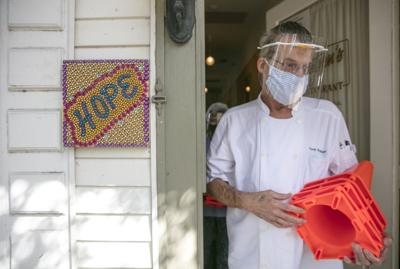
PHOTO BY CHRIS GRANGER
In March, Marna and Frank Brigtsen renewed the lease on the Riverbend cottage that their Brigtsen’s Restaurant calls home. It was an affirmation; even in the teeth of the pandemic, they were doubling down on the future of their restaurant.
A few days later, Frank Brigtsen learned he had contracted COVID-19. He had to temporarily close the restaurant.
The chef has since recovered after what he called mild symptoms, and Brigtsen’s reopens Tuesday, ready to resume its 35th year in business.
The experience offers a condensed version of the undulating course of the crisis for New Orleans restaurant people.
PHOTO BY CHRIS GRANGER
For a year, they have seen their industry all but closed down and gradually reopened. They’ve worked through restrictions that tighten and loosen like a tide they can’t predict. They’ve had their spirits crushed and revived, their fears confirmed and their faith renewed.
But however dire the stakes seemed in the darkest phases of the crisis, what most New Orleans restaurants have done is hang on.
This week marks one year since dining rooms were ordered closed across Louisiana in the coronavirus fight, at a stroke reducing a world-famous dining scene to a desperate trickle of takeout business. The same order completely closed all bars, casting a pall over their own place in the local cultural landscape.
The massive numbers of restaurant closures that industry experts initially feared (up to 50% in some forecasts) have not occurred here, despite heartrending individual closures.
They’ve made it thus far with federal relief through the Payroll Protection Program, with the support of locals stepping up in a market that normally welcomes hungry visitors by the millions and, crucially, through their own determination to maintain what they’ve built and its role in New Orleans life.
Now, at the one-year mark, there is finally a growing sense of not just hope, but optimism.
“I feel better about our situation now than I have through this whole time,” said Frank Brigtsen. “If we can keep the course, I think our restaurant industry will have a wonderful summer, and we never say that about summer in New Orleans, but that’s just how good things are looking to me now.”
The lift in local restaurant outlook hardly signals victory or an end to the crisis. Most restaurants are still seeing only a fraction of normal business; coronavirus remains a grave danger; and for some restaurants that have remained closed, the road back is still far from clear, as we’ll see below.
But several factors point to the change in prospects around the industry.
The federal relief bill President Joe Biden enacted last week over Republican opposition promises renewed support to get through the next few months. It includes a $28.6 billion package specifically tailored to restaurants. Industry advocates nationally have hailed it as the lifeline they’ve been pleading to get over the past year.
Vaccination rates are rising, and with them the hope that the country can stave off another surge as reopening progresses and coronavirus variants circulate.
But to understand why the optimism right now is so visceral, consider how things looked a year ago.
Galvanized to fight
On the eve of the closure orders, Bywater American Bistro was marking its second anniversary, normally a milestone when a new restaurant can feel more secure in making it. But all that chef and co-owner Nina Compton could feel was dread for what was coming.
“As an owner, you’re the leader, you’re supposed to have the answers, and we had no answers,” Compton said. “You work so hard to build it, and it’s literally taken away from you with no control.”
PHOTO BY SOPHIA GERMER//THE TIMES-PICAYUNE | THE NEW ORLEANS ADVOCATE
There were points, Compton acknowledged, when she thought she’d have to permanently close both Bywater American Bistro and her first restaurant, Compère Lapin. But then, her will to keep fighting was galvanized again and again.
“My driving force is making it to the other side,” she said. “When we come back, the restaurants are going to be booming and I want to be part of that.”
Compton joined chefs and restaurateurs from across the country in the Independent Restaurant Coalition, which formed in the crisis and, along with other advocates, has been pushing for the federal relief Biden recently signed into law.
STAFF PHOTO BY SOPHIA GERMER
Back at her restaurants, with tourism all but absent, local customers kept the doors open.
“Accolades and awards don’t mean anything in times like that, it comes down to people who love your restaurant and want to show their support,” said Compton. “We’re here because of the locals who want to preserve the cultural landscape of this city and understand that restaurants are part of it.”
Ramping back up
When the first closure orders came, layoffs followed within days and sometimes by the hundreds at larger restaurants and local hospitality groups that suddenly had no way to keep people working.
Behind the scenes, these companies were furiously trying to reconfigure their finances, find whatever streams of business they could, and keep their overall operations intact to return whenever conditions improved.
Donald Link, founder of the six-restaurant Link Restaurant Group, dismissed early projections of a short-term crisis that might clear in a few months.

